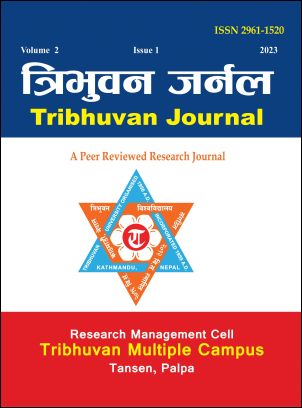Physico-Chemical Parameterization of some Commercially Available Toilets and Laundry Soaps in Tansen, Palpa
DOI:
https://doi.org/10.3126/tribj.v2i1.60219Keywords:
Cleansing action, lubricating, quality criteria, competency, laundryAbstract
Nepalese market has witnessed an impressive upsurge in the production and consumption of a variety of soaps in recent times since 2022 after covid pandemic. The physicochemical parameterization determines the quality, competency and cleaning properties of soap so that we urge sagacious use of these soaps to keep skin healthy. Due to scant knowledge about the quality of soaps, there is need to assess them. Ten parameters namely foam height, surface tension, pH, moisture content, conductance, total fatty matter, total alkali, free caustic alkali and chloride content of commercially available toilet (Dettol, Lifebuoy, Liril, Lux, No.1, Haldi Kanti, Neem Kanti and Neem Chiuri) and laundry soap (Aaha, Darshan, Dhoni and Xpert) samples collected from local market of Tansen were determined using different standard documented method of analysis. The physicochemical parameters examined in collected different soap samples are found as; foam height (20-120) ml, surface tension (38.857-67.192) dynes/cm, pH (6.67-10.54), moisture content (6.68-34.40) %, conductance (115-327) µs/cm, Total Fatty Matter or T.F.M. (42-85.10) %, total alkali (0.31-1.178) %, free caustic alkali (0.54-0.91) % and chloride content (0.1-0.69) %, indicating most of examined parameters for soap were in standard limit as quality criteria set by Bureau of Indian Standards, IS 286: 1978 except that of free caustic alkali content in laundry soaps. This study has recommended public to use toilet soap for bathing purpose as it removes dirt more and laundry soap are found to have good cleansing action for clothes.




